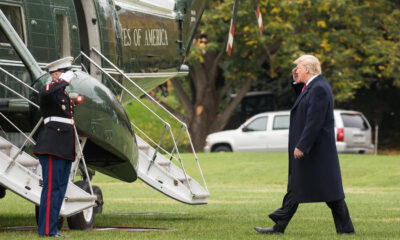Executive
Phantom Menace: Navigating the Perils of Russian Ghost Fleets
Russian ghost fleets have emerged as hazards to navigation, and could permanently imperil freedom of the seas.

Russian ghost fleets, or shadow fleets, pose an urgent and multifaceted threat to maritime security and global geopolitical stability. Deploying these fleets, composed of vessels that obscure their ownership, origin, and movements, introduces significant short-term and long-term risks that demand an immediate and concerted international response.
Short-Term Maritime Risks of Russian Ghost Fleets
In the immediate term, the presence of these shadow fleets exacerbates maritime safety hazards. Operating ‘off the grid,’ these vessels often eschew international maritime regulations, including vessel tracking and safety standards. This creates a twofold risk: increased potential for maritime accidents and heightened difficulty in search and rescue operations.
The clandestine nature of these fleets means they often engage in risky maneuvers to avoid detection, increasing the likelihood of collisions and environmental disasters such as oil spills. The lack of accountability and traceability makes it challenging to respond effectively to such incidents, posing a direct threat to the marine environment and coastal economies reliant on healthy ocean ecosystems.
These vessels are frequently involved in illicit activities such as smuggling and sanctions evasion. This undermines global efforts to enforce maritime laws and regulations, fostering a climate of impunity that encourages other actors to flout international norms. The short-term implications are clear: increased illegal maritime activities and a corresponding rise in regional instability.
Long-Term Geopolitical Risks
The long-term geopolitical risks associated with Russian ghost fleets are equally concerning. At the heart of this issue is Russia’s strategic utilization of these fleets to circumvent international sanctions and continue its global operations unimpeded. This undermines the efficacy of sanctions as a tool of international diplomacy and weakens the international community’s ability to enforce compliance with global norms.
The shadow fleet phenomenon also highlights the broader maritime domain awareness (MDA) issue. The ability to monitor and understand activities in the maritime domain is crucial for national and global security. The operations of these ghost fleets reveal significant gaps in current MDA capabilities, which adversarial states can exploit to conduct covert operations and project power asymmetrically. This diminishes the strategic advantage of nations reliant on superior maritime surveillance and creates an uneven playing field in global naval operations.
Freedom of the seas
From a geopolitical perspective, normalizing such clandestine operations could lead to a more fragmented international order. As more states or non-state actors adopt similar tactics, the predictability and stability of maritime routes, crucial for global trade, will be compromised. This could increase the militarization of vital maritime chokepoints as states seek to protect their interests against shadowy threats. The resultant escalation in military presence heightens the risk of confrontations and miscalculations, potentially sparking broader conflicts.
The economic implications are significant. The shadow fleet’s role in sanctions evasion allows Russia to sustain its economic resilience despite international efforts to isolate it economically. This not only prolongs geopolitical tensions but also sets a dangerous precedent. If other nations observe the effectiveness of this tactic, they may adopt similar measures to bypass sanctions, thereby undermining the overall effectiveness of economic sanctions as a diplomatic tool.
Strategic Responses to Russian Ghost Fleets
Addressing the risks posed by Russian ghost fleets requires a varied approach. Enhanced international cooperation on maritime surveillance and intelligence sharing is paramount. This includes investing in technologies that improve vessel tracking and identification, even during deliberate obfuscation efforts. Strengthening legal frameworks to hold those involved in illegal maritime activities accountable is also crucial.
On a diplomatic level, a concerted effort must be made to close the regulatory loopholes that these shadow fleets exploit. These loopholes could include lax vessel ownership and registration regulations and insufficient enforcement of international maritime laws. This involves tightening controls on the sale and transfer of vessels and ensuring that international maritime laws are robustly enforced.
Enhancing the capabilities of regional maritime security initiatives can provide a more localized and immediate response to the threats posed by these fleets. Initiatives like the Proliferation Security Initiative (PSI) and regional cooperative frameworks should be leveraged to build a comprehensive security network capable of countering the operations of these ghost fleets.
The risks of Russian ghost fleets are both immediate and far-reaching, impacting maritime safety, international legal norms, and geopolitical stability. A coordinated international response, underpinned by enhanced surveillance, stringent enforcement of maritime laws, and robust diplomatic measures, is essential to mitigate these threats and ensure the security and stability of global maritime operations.
This article was originally published by RealClearDefense and made available via RealClearWire.
Jeffrey R. Wells is a Navy Veteran, a Fellow at the National Security Institute at George Mason University’s Antonin Scalia Law School, the Chief Security Officer for #AfghanEvac, a Truman National Security Project Fellow, and a Council on Foreign Relations Life Member.
-

 Civilization2 days ago
Civilization2 days agoWhy Europe Shouldn’t Be Upset at Trump’s Venezuelan Actions
-

 Accountability5 days ago
Accountability5 days agoWaste of the Day: Principal Bought Lobster with School Funds
-

 Executive3 days ago
Executive3 days agoHow Relaxed COVID-Era Rules Fueled Minnesota’s Biggest Scam
-

 Constitution4 days ago
Constitution4 days agoTrump, Canada, and the Constitutional Problem Beneath the Bridge
-

 Christianity Today2 days ago
Christianity Today2 days agoSurprising Revival: Gen Z Men & Highly Educated Lead Return to Religion
-

 Civilization3 days ago
Civilization3 days agoThe End of Purple States and Competitive Districts
-

 Executive3 days ago
Executive3 days agoWaste of the Day: Can You Hear Me Now?
-

 Executive4 days ago
Executive4 days agoWaste of the Day: States Spent Welfare in “Crazy Ways”














